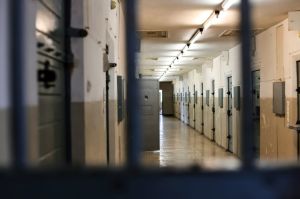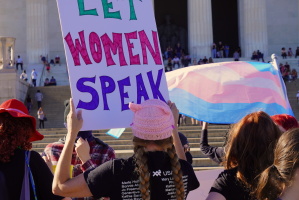Outlawing 'conversion therapy' does not protect children

On March 4, I flew to Boston to testify at the Massachusetts capital hearing regarding the proposed bills H.140/S.70, which if passed, would ban conversion therapy.
My reasons for going were very personal and close to my heart. I feel strongly that the ban on conversion therapy for minors would greatly hinder much needed holistic care that health-care professionals can offer to children who question their sexual identity and orientation.
Many states desire to ban conversion therapy because it has been labeled harmful. And in fact, some of the examples of “conversion therapy” described in the hearings included such harmful practices as electric shock therapy, exposure to pornography, forced separation from loved ones, and extreme public shaming. However, the greater health-care community, including those with faith-based practices, already considers these methods barbaric and unethical. Blasted by the media, this kind of “conversion therapy” has become a straw man, erected with the intent of advocating one sided and biased counseling methods that support an ideology that sexuality is completely fixed.
But do not be misinformed. The proposed legislation in Massachusetts (and similar bills being proposed elsewhere) is about much, much more than protecting children from shock therapy and other ill-favored practices. These bills define “conversion therapy” in such a way as to prohibit any health-care professional from therapeutically questioning a minor’s sexual orientation or desire to transition gender. Under this law, a health-care professional could have their license suspended for doing anything other than affirming a minor’s feelings of same-sex attraction or perceived gender identity. Furthermore, if passed, these laws would threaten parental rights. If a child’s physician prescribes medications, such as non FDA approved hormone blockers, or further suggests surgery to transition a minor, concerned parents could lose their parental rights to do what they think is ultimately in the best interest of their child. Instead, the state would decide what is best under this bill.
Here is a summary of what I shared and my concerns regarding this growing trend.
“My name is Liz Flaherty. I am 40 years old, and I was born into a Christian family.
I was sexually abused at the age of six by a trusted older family friend, a fact that I hid from my parents out of fear and shame. Keeping this secret left me feeling tormented, rejected, and alone. I developed very low self-esteem, which was reinforced by massive amounts of bullying and rejection I endured by my male peers growing up.
I hated myself. I believed I was abnormal. I lived a life of shame.
No matter how hard I tried to intimately relate and connect with men, I found that those relationships left me feeling shallow, compared to the depth of intimacy and connection I felt with women.
Because of these feelings, I CAME OUT my senior year of high school as a lesbian, much to the confusion of my parents. Even in their sadness, however, they did not reject me, and I was greatly supported by my highly liberal community in our small town in northern California.
Coinciding with my sexual liberation, in my early twenties, tragedy struck our home, and I lost both my parents in a three-year time period to cancer. I became the legal guardian of my brother, who was 12 years old at the time.
Soon after our loss, I began seeking help for my overwhelming grief, and I went to a faith-based therapist and then later a ministry that offered group therapy for those questioning their sexuality. There I began to unpack many of my life traumas for the first time. I discovered that I’d emotionally put up barriers to men from a very early age, in order to protect myself.
My attractions to women began in a legitimate way…from a desire to be safe, to be loved, and to be accepted… but these needs had become sexualized in order to find the security for which I longed. During this process, I allowed myself to question this place of self-protection, because I wanted every part of my heart to be alive. I wish I had been brave and told my parents about the abuse. I wish I had seen a faith-based therapist or had access to this ministry group as a minor. It would have saved years of pain.
My counselor didn’t promise she could make me straight or take away my deep longings to be with a woman. However, she did assist me through talk therapy, in facing my traumas, which included her directly questioning my same-sex attractions. This therapy, in turn, began to dismantle the barricades I’d created, and my drive for sexual intimacy with women shifted because of the freedom I found.”
Today, I’m part of a network called The Changed Movement, a faith-based network of individuals (and ministries) from around the world who have come together to share our stories of change in sexual orientation and gender identity. We desire to provide support and hope for those who want to question their sexuality and change their lives.
I was one of five members from the Changed Movement group who traveled to Boston for the hearing because we greatly care about the options LGBTQ youth have when questioning their sexuality as we did. Not everyone who experiences same-sex attraction or has a desire to transition gender has been sexually abused or neglected; however, the effects of trauma, when experienced, need to be addressed and explored. A health-care provider who cannot by law question the minor’s feelings of attraction, lest he or she be deemed non affirming, would be restricted in his or her ability to treat the whole child.
Sharing my testimony at the Boston hearing was the first time that I have shared publically about my sexual abuse as a child. Up until this point, I had chosen not to share for various reasons, one being that I didn’t want to create a greater barrier between the church and the LBGTQ community. I wanted to prevent reinforcing any stereotype that LGBTQ people are somehow sexual perverts or other nonsense. Those who identify as gay are no more likely to sexually abuse a child as those who are not. However, since this bill directly affects the therapy and counseling support that minors will be allowed to access, I chose to disclose this part of my story.
As difficult as it was to open my heart to a group of strangers and share about my abuse, the response by opposing senators was even more disheartening. After a fellow panelist and I shared similar stories, we were met with great hostility from one particular state senator. Offended and disgusted, he considered us to be “flippant” in sharing about our sexual abuse, particularly in light of how our experiences impacted our journey to wholeness. What’s more, he seemed unwilling to acknowledge that sexual abuse can cause great confusion in an adolescent’s sexual development. But statistics suggest many children are facing unreported sexual abuse, as was in my case.
According to the National Children’s Alliance, one in ten children will be sexually abused before the age of eighteen. Over sixty percent will not report it to an adult.
Sexual abuse absolutely colored my lens as a child. None of us who testified at the hearing desire to limit therapy options and support for LGBTQ youth who seek affirmation for their feelings and expression of their sexual orientation. We do take issue, however, with laws that limit health-care professionals’ abilities to holistically help minors. Nor can we support legislation that would take away a parent’s right to seek care for their questioning youth based on their core values.
Those of us who have experienced change will no longer allow intimidation to silence us. There are a growing number of us who are testifying to the transformational power of the gospel of Jesus Christ. Our voices will be heard. Our stories matter.
To read additional stories regarding the Changed Movement please click here: The Changed Movement
Originally posted at lizgflaherty.com
Liz Flaherty lives in Nashville, Tennessee with her husband Andy. They’ve been married since 2005, and have spent the majority of their marriage ministering to and mentoring people in areas of sexual wholeness and identity. She has written two books, Discover Eden: Empowering Christian Women to Walk in Sexual Liberty, and The God of My Parents: The Uncensored Account of My Journey to Find Identity.




























